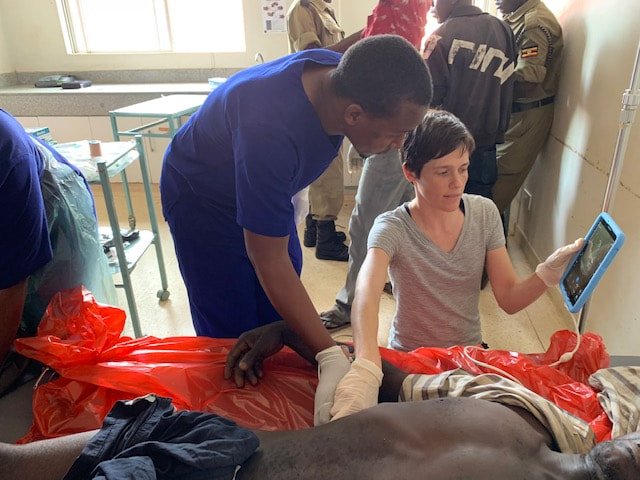"Here in our ultrasound images, we had been able to identify the root cause of…
ULTRASOUND CHRONICLES: MASS CASUALTY CASE

“Within one day, I’d seen the training and careful preparation in the morning and practical application of the same knowledge in the afternoon. A great day of Global Emergency Care at work.”
By: Dr. Michael Schick, GEC Ultrasound Director
As a second year Emergency Care Practitioner (ECP), Friday mornings are spent learning through simulation. On my recent trip to Uganda one of the morning simulations was a mass casualty event. In the simulation, a pregnant mother with her two children were riding on a boda when it crashed. Four patients, two with life threatening emergencies and two who were injured but less severely. The ECP running the case is tasked with rapidly assessing each patient, triaging them, quickly deciding who needs immediate intervention and assigning tasks to other ECPs. Each ECP is assigned to one of the patients with priorities set.
It was a fun and engaging morning of learning and I was impressed with the skills demonstrated and questions generated by the ECPs. We discussed prior mass casualty events that have come through the ED at Masaka and how the ECPs divided tasks during those events. With road traffic accidents being so common and so deadly in Uganda, this is something the ECPs had witnessed many times. Entire buses that have rolled over, two bodas with several passengers each colliding, open trucks with several people in the back that veered off the road. Each event is challenging, intellectually and emotionally, and the ECPs shared what they had learned from these events.
That afternoon, we joined the other ECP trainers in the emergency department seeing patients. The ED was busy that afternoon and the ECPs were busing seeing several patients; one with a piece of wood stuck in the bottom of the foot, another with a large laceration of the hand, a patient with pneumonia, another with abdominal pain, another with malaria. A truck pulled up outside and Alfunsi went to assess the situation. When came back in, he announced that we had a mass casualty. The truck was loaded up with several injured men, all from the same accident, some walking, some unable to walk. A truck had rolled over on the road outside of town. We were about to do what they’d just trained for.
The ECPs began putting on personal protective equipment (gloves and gowns) and taking stretchers outside and making space in the crowded department. Alfunsi assumed the role of leader, directing the others who were doing primary and secondary surveys of each patient. One of the ECPs went bed by bed with the ultrasound machine doing EFAST exams.
Having working in U.S. EDs and witnessed similar large scale trauma events over many years, I must say, the ease and rapidity with which the ECPs assessed and managed these patients was SMOOTH. What can seem like chaos for someone watching for the first time, is in fact well-orchestrated prioritization through systematic evaluation and when done right, it is a beautiful thing. When done poorly, patients can die. A true emergency provider looks past screaming and blood and fearful patients to see the problems that need an immediate intervention: abnormal vital signs, a positive FAST, or pneumothorax. This is the difference between good training and poor preparation. The ECPs were completely unfazed. Alfunsi had prioritized two of the patients as critical within five minutes. The ECPs managed each injury from large to small. One was sent to the OR and another needed transfer for a spinal fracture. The remaining patients were lower acuity and though some would be admitted, there were no further critical procedures needed.
Within one day, I’d seen the training and careful preparation in the morning and practical application of the same knowledge in the afternoon. A great day of Global Emergency Care at work.
Ultrasound Machine Fundraiser for GEC – 100% Match
Thanks to a very generous gift from the Ellis family in honor of their parents, Dan and Barbara Ellis, we will be offering a 100% match on all ultrasound donations up to $10,000. Our goal in the next month is to raise $30,000 to fix one of our current ultrasound machines and to purchase two new ultrasound machines.



This Post Has 0 Comments